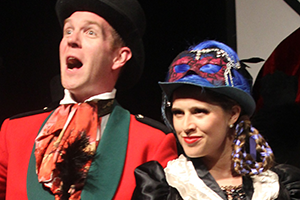 The Australian creative sector employs hundreds of thousands of people, with a high proportion of these being sole trader contractors, SMEs and casuals. It contributes around $111 billion to the Australian economy including over $3.5 billion in exports. The industry is reliant on national and international touring, audiences attending venues and participating in training and education programs. According to the Australian Bureau of Statistics1, in 2017-18, eighty-two percent of Australian’s over the age of 15 had attended a cinema, art gallery, museum, library, or live performance. Live performances account for over 38percent of these attendances.
The Australian creative sector employs hundreds of thousands of people, with a high proportion of these being sole trader contractors, SMEs and casuals. It contributes around $111 billion to the Australian economy including over $3.5 billion in exports. The industry is reliant on national and international touring, audiences attending venues and participating in training and education programs. According to the Australian Bureau of Statistics1, in 2017-18, eighty-two percent of Australian’s over the age of 15 had attended a cinema, art gallery, museum, library, or live performance. Live performances account for over 38percent of these attendances.
The creative sector was the first industry to be affected by cancellations and closures due to the current pandemic related shutdown. It is also likely to be one of the last sectors to benefit from restrictions being eased. But the industry is not one to sit still and wait for this situation to blow over, they are demonstrating a range of innovative approaches to keeping Australian audiences informed and entertained.
University drama courses closing down and no accredited vocational acting classes available in the ACT was the motivation behind playwright, Elizabeth Avery Scott, and her actor/director husband, James Scott, starting Perform Australia (then known as Canberra Academy of Dramatic Art) In 2009. “We started at the kitchen table. James did most of the teaching and I was writing and running the business”, says Elizabeth.
Perform Australia has continued to grow over the years and now offers accredited and industry-approved courses alongside a range of children’s programs. The organisation moved into its new, larger premises in 2018. Elizabeth says that at their peak in 2018, Perform Australia had 700 students in Canberra, regional NSW and Brisbane. “We expanded our reach in 2017 by purchasing a small acting studio in Brisbane”. While numbers were down a bit in 2019, they still had 70 students enrolled in their accredited courses, 500 children in programs and a growing cohort of adults participating in leisure programs from term to term.
"Our aim", says Elizabeth, "was to keep growing by replicating programs and reaching 1000 students on a regular basis but then came COVID-19. The impact has been quick and reactions from our clients varied".
Overcoming the challenges
“As COVID-19 hit it became clear that a couple of the children’s musical shows that were due to go on in April couldn’t go ahead. Many of the parents were keen for it to proceed but it became clear in March that it wasn’t possible”.
“There was a great sense of loss for students and their parents because they had all worked so hard and been together for so long,” says Elizabeth, “we couldn’t live stream it either, because we weren’t allowed to have the kids together in the studio”.
Other classes, however, moved online very quickly. Elizabeth is currently undertaking some university studies and with some insight into how the health sector was gearing up to deal with the COVID-19 situation, this helped her make that decision pretty quickly. Elizabeth said she knew that she had to salvage as much as possible or the school would lose the majority of students for term two.
Elizabeth said she called a meeting of the kid’s curriculum team and brainstormed which of their face-to-face programs could be done online. They came up with some great ideas of how to use Zoom for training around character development and vocal development.
“We introduced the idea of teaching vocal development through voicing animated characters and doing radio plays for older kids. We also developed some school holiday programs quickly using different themes like Harry Potter and Macbeth to teach kids about different character development techniques,” says Elizabeth. “You can still read a script and play drama games online, but the challenge is that the premise of our business is face-to-face, so how do we convince our students that online is just as effective. Elizabeth believes that changing this perception may make performance more inclusive and appeal to a broader audience.
Some parents felt online drama classes didn’t suit their children, says Elizabeth but many were really supportive, saying it was the highlight of their child’s week. Online learning doesn’t suit everyone and both adults and kids are looking forward to getting back to face-to-face learning. Some of our students are coming back part-time next week and some will continue to work online for a while longer.
The part-time stream of older students in Perform Australia’s Certificate IV in Acting for Stage and Screen program were more accepting of online learning because they saw no other option. Elizabeth said that they have adapted but those also working on Zoom in their regular jobs are a bit over it. “We have only lost a few of our vocational students during this time and many are getting impatient about wanting to get back face–to–face. It’s a desire to be connected. We have also found that a small group really enjoyed learning on Zoom because they have felt less inhibited by others being in the same room”.
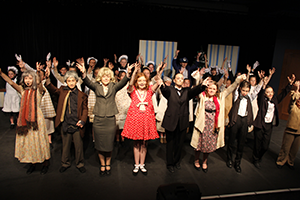
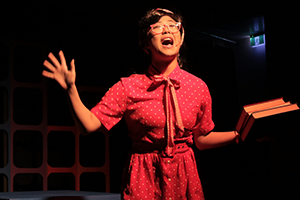
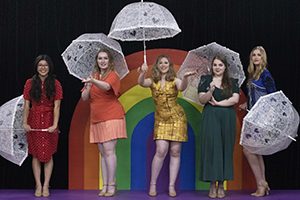
A time of innovation and change
Elizabeth says staffing is an issue and she will have to stagger their return over the next few weeks to fit in with their other commitments. This whole thing has been very stressful, it has taken lots of long hours to restructure and test everything. But the upside, says Elizabeth, is that it has been an extraordinary time of change and innovation for the industry in general.
The changes came with a range of challenges. Elizabeth said that it was really hard to manage the children’s disappointment when their technology dropped out. But we have no control over that. Supporting the team and walking them through the changes as a leader, was also challenging. “We had to let go of 16 staff and had a few people who resigned because they didn’t want to work through the COVID situation”, says Elizabeth.
“We had a great team culture and there was a wave of loss through the company when these team members left. The repercussions are sometimes unseen, so I have talked to the team and given them an opportunity to talk to me about anything that concerns them.
“Actors are used to working in space (theatres and movies studios) and they have had to re-think how they train and teach performance in a virtual environment. Some think that it can’t be taught online because acting happens in the moment and in contact with others. Part of my job as a leader was to motivate them and to support and generate the enthusiasm. They are now enjoying the new approach to work and the kids really appreciate what the teachers are doing. Even as creatives they found the change hard”, says Elizabeth.
Impact on the creative sector
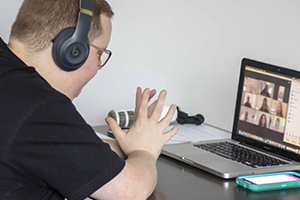 “We have all felt the impact on the industry”, says Elizabeth.
“We have all felt the impact on the industry”, says Elizabeth.
“We had to shut down one of our Certificate programs. We spoke to all the students before we hit pause, but they really wanted the live performance experience, which was the next project in their training. We have delayed this until term 4 and need to keep the enthusiasm going. Our staff has also been directly impacted. Our musical director for example, has worked in New York and she is keeping herself informed about how infections spread and is being cautious about how singing and dancing is taught going forward. This is making the industry rethink a lot of things”.
Elizabeth is a great advocate for the creative sector and believes that government needs to better understand how the creative industries work. When funding was cut for student loans and support for the creative sector in 2016, Elizabeth was trying to lobby government to understand that the arts sector doesn’t work like other sectors. “They are effectively freelancers working on lots of different projects”, says Elizabeth.
When Jobkeeper was being promoted it became evident that many arts workers wouldn’t be eligible.
“You can’t measure outcomes in the arts sector in the same way as other sectors, particular when it comes to education”, says Elizabeth.
“Decisions regarding student funding is often based on the ability to repay loans and policymakers partly make their decisions by counting how many jobs are advertised in a sector. Many arts jobs come through agents or contacts; they are never advertised”.
Elizabeth is hopeful that the current situation has opened the Government’s eyes to the fact that creatives don’t fit the 9 – 5 work profile. This is an important discussion to have and to understand the life of someone working in the creative industries.
Where to from here?
When talking about Perform Australia’s future direction, Elizabeth says that it may continue to offer some kids’ classes online particularly for regional kids.
“There has been a good uptake during this period and possibly a market that we haven’t tapped into to date”.
“There is also the question of international markets – how can we reach a more international market with our programs. It’s early days and we are thinking about it. We are looking into streaming a performance at the end of term for assessment purposes, but this again is all new to us. There are theatre companies around the world doing this and it might create some records that we can use in the future”.
Elizabeth thinks that new technology might emerge to allow them to use mixed media platforms to do performances that can lead to some creative outcomes and new delivery platforms.
One thing is clear, the changes brought by COVID-19 have been challenging and in some cases heartbreaking, but business unusual provides a number of opportunities for Perform Australia to hit that 1000 plus student mark.
1 ABS: 4114.0 - Attendance at Selected Cultural Venues and Events, Australia, 2017-18



